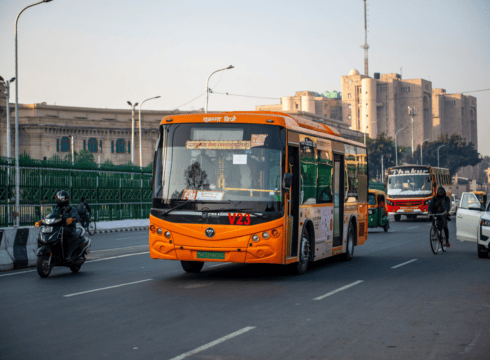Of the total estimated cost, the centre will infuse INR 20,000 Cr into the project
The initiative will support bus operations in select cities for a period of 10 years
The project is expected to generate 45,000 to 55,000 direct jobs
Inc42 Daily Brief
Stay Ahead With Daily News & Analysis on India’s Tech & Startup Economy
The Union Cabinet on Wednesday (August 11) approved a new scheme under which 10,000 electric buses (ebuses) would be deployed in 169 cities on a public-private partnership (PPP) model.
Called PM-eBus Sewa, the scheme will have a total estimated cost of INR 57,613 Cr. Of this, the Centre will offer INR 20,000 Cr. The initiative will support bus operations in select cities for a period of 10 years.
The initiative will cover cities with a population of more than 3 Lakh people, encompassing all capital cities, the North-Eastern region and hill states. The scheme will prioritise cities with no organised bus service. As per an official statement, the government said that the project will generate anywhere between 45,000 to 55,000 direct jobs via the deployment of ebuses.
The project will be divided into two segments. While Segment A would see the deployment of ebuses in 169 cities, Segment B will entail the upgradation of related infrastructure in 181 cities.
Segment A has been envisaged with augmenting bus operations in the city. In addition, the government believes that associated infrastructure connected with the deployment of buses will provide support for the development of depot infrastructure and the creation of behind-the-meter power infrastructure (such as substations) for ebuses.
Meanwhile, Segment B, which has been termed ‘Green Urban Mobility Initiatives’ (GUMI), will cover 181 cities. These initiatives aim to create allied green infrastructure such as charging infrastructure, multimodal interchange facilities, and NCMC (National Common Mobility Card)-based automated fare collection systems, among others initiatives.
Under GUMI, state (or city) authorities would be the nodal agencies for operating the ebuses and making payments to bus operators. Meanwhile, the Centre’s role will only be restricted to offering subsidies for bus operators under the scheme.
As per the government, the project will give a major boost to the promotion of electric mobility and will accelerate the proliferation of energy-efficient electric buses in the country. The scheme also aims to foster innovation in the e-mobility sector and to fuel the development of a resilient supply chain for electric vehicles.
“This scheme shall also bring in economies of scale for procurement of electric buses through aggregation for ebuses… Adoption of electric mobility will reduce noise and air pollution and curb carbon emission…. Modal shift due to increased share of bus-based public transportation will lead to GHG (greenhouse gas) reduction,” an official statement read.
The development comes amid reports that the government has prepared the first draft of the FAME-III scheme, with a proposed outlay of INR 40,000-50,000 Cr. The scheme is expected to provide substantial allocation to support the adoption of electric buses.
Not just this, state-backed agencies have pumped thousands of crores into local ebus manufacturers to spur the adoption of electric mobility in the country.
Note: We at Inc42 take our ethics very seriously. More information about it can be found here.


